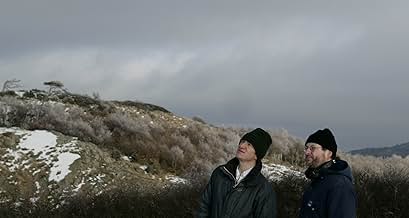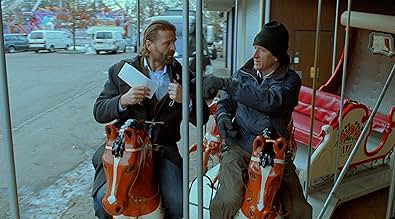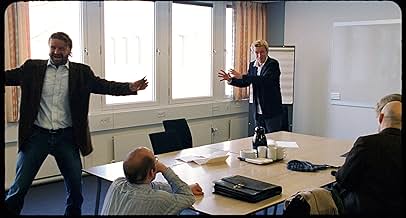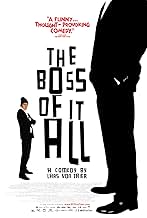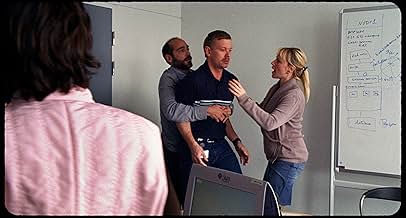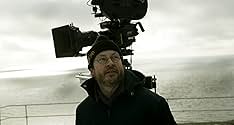IMDb-BEWERTUNG
6,6/10
13.195
IHRE BEWERTUNG
Ein IT-Unternehmen stellt einen Schauspieler als Firmenpräsident ein, um einem verschrobenen Isländer beim Verkauf des Unternehmens zu helfen.Ein IT-Unternehmen stellt einen Schauspieler als Firmenpräsident ein, um einem verschrobenen Isländer beim Verkauf des Unternehmens zu helfen.Ein IT-Unternehmen stellt einen Schauspieler als Firmenpräsident ein, um einem verschrobenen Isländer beim Verkauf des Unternehmens zu helfen.
- Regie
- Drehbuch
- Hauptbesetzung
- Auszeichnungen
- 1 Gewinn & 7 Nominierungen insgesamt
Friðrik Þór Friðriksson
- Finnur
- (as Fridrik Thor Fridriksson)
Lars von Trier
- Narrator
- (Nicht genannt)
Empfohlene Bewertungen
In Lars von Trier's small-scale, Automavision (computer-edited) Danish-language film comedy Ravm (Peter Gantzler) is the spineless (but mean) CEO of an IT company. He's such a people-pleaser he's hidden his real rank all along so the staff won't resent his more unpopular decisions. Now on the verge of selling the company out from under them, he calls in a "self-important, out-of-work" actor, Kristoffer (Jens Albinus) to play the role of "boss of it all"—be his front man by proxy to sign the papers. Lars himself pops up at the middle and end as a voice and at the beginning as a voice and a reflection—just long enough to mock himself and us. He also makes fun of Danes for their sentimentality and giggling and chatter, and, because the buyers of the company are Icelandic, he makes fun of Icelanders for their over-reliance on their ancient sagas and their petulant rages.
Americans don't take a beating this time, though there's one American member of the company cadre, Spencer (Jean-Marc Barr) who's completely ineffectual around the office because he can't finish a sentence in Danish. Lars has lots of fun with actors here, and of course with offices and corporate manipulations. Kristoffer has some kind of quixotic idol called Gambini whose "masterpiece" is a droning monologue of a chimney sweep. He puts soot on his forehead for luck when embarking on his role. As the boss, previously known to staff via e-mails only as Svend E., Kristoffer is completely inept, but the six-person startup cadre members nonetheless react to him as if he were the real deal and are variously ready to beat up, have sex with, or marry him. The women act like woman (with especially nice turns by Iben Hjejle and Mia Lyhne), and the men act like children. They weren't even meant to see him: that's just the first thing that goes wrong—due to the actor's excessive zeal, he goes and introduces himself. As he gets in deeper and deeper—with zero preparation—he finds himself constantly begging Ravm for secret coaching sessions "on neutral ground" (which includes the zoo). But these do nothing to limit his amazing ability to gum up the works for everybody, especially Ravm. Things turn farcical when Finnur's lawyer shows up and turns out to be Kristoffer's ex-wife, Kisser (Sofie Grabol). Will she give away the game?
This all makes a lot of sense if you've seen Von Trier's earlier film, the semi-documentary The Five Obstructions (2003), in which he and his film-making mentor Jørgen Leth teamed up to provide, indirectly, a kind of skeleton-key to his mind. The Dogme film-making "vow of chastity" reflects von Trier's own masochistic, Brechtian, but—given the grimness of some of his film content—surprisingly playful need to be forever imposing new rules and limitations that challenge actor, filmmaker, and audience. The Five Obstructions, where the director spars with mentor Leth, shows that he's also an affectionate and modest tease. "Although you can see my reflection, this film won't be worth a moment's reflection," is his personal opener to The Boss of It All.
That "moment's reflection" von Trier says we won't need suggests on the contrary how reflexive and clever all this actually is. The film, which could be seen as a sort of droll, deadpan parody of "The Office" (though von Trier says he hasn't even seen the TV series), is a set of characters and premises that create their own movie, just as the computer editing device does. And just as we're startled and appalled at times by the ugliness of shifting light and sound levels and pointless jump cuts the Automavision produced, von Trier and his actors may have been surprised at how some of the set-ups turned out. Will Svend, AKA Kristoffer, sign over the company to the growling Icelander, Finnur (Fridrik Thor Fridriksson)? Even he doesn't know. He has to "consult" his "character." And that makes him, like Lars, a big tease. 'The Boss of It All' may be more intriguing than funny—and there will be those, primed too intensely by 'Dogville' and 'Manderlay,' who'll see it as merely cruel and misanthropic, but it's a complete change from his recent stuff, and yet utterly in character.
Americans don't take a beating this time, though there's one American member of the company cadre, Spencer (Jean-Marc Barr) who's completely ineffectual around the office because he can't finish a sentence in Danish. Lars has lots of fun with actors here, and of course with offices and corporate manipulations. Kristoffer has some kind of quixotic idol called Gambini whose "masterpiece" is a droning monologue of a chimney sweep. He puts soot on his forehead for luck when embarking on his role. As the boss, previously known to staff via e-mails only as Svend E., Kristoffer is completely inept, but the six-person startup cadre members nonetheless react to him as if he were the real deal and are variously ready to beat up, have sex with, or marry him. The women act like woman (with especially nice turns by Iben Hjejle and Mia Lyhne), and the men act like children. They weren't even meant to see him: that's just the first thing that goes wrong—due to the actor's excessive zeal, he goes and introduces himself. As he gets in deeper and deeper—with zero preparation—he finds himself constantly begging Ravm for secret coaching sessions "on neutral ground" (which includes the zoo). But these do nothing to limit his amazing ability to gum up the works for everybody, especially Ravm. Things turn farcical when Finnur's lawyer shows up and turns out to be Kristoffer's ex-wife, Kisser (Sofie Grabol). Will she give away the game?
This all makes a lot of sense if you've seen Von Trier's earlier film, the semi-documentary The Five Obstructions (2003), in which he and his film-making mentor Jørgen Leth teamed up to provide, indirectly, a kind of skeleton-key to his mind. The Dogme film-making "vow of chastity" reflects von Trier's own masochistic, Brechtian, but—given the grimness of some of his film content—surprisingly playful need to be forever imposing new rules and limitations that challenge actor, filmmaker, and audience. The Five Obstructions, where the director spars with mentor Leth, shows that he's also an affectionate and modest tease. "Although you can see my reflection, this film won't be worth a moment's reflection," is his personal opener to The Boss of It All.
That "moment's reflection" von Trier says we won't need suggests on the contrary how reflexive and clever all this actually is. The film, which could be seen as a sort of droll, deadpan parody of "The Office" (though von Trier says he hasn't even seen the TV series), is a set of characters and premises that create their own movie, just as the computer editing device does. And just as we're startled and appalled at times by the ugliness of shifting light and sound levels and pointless jump cuts the Automavision produced, von Trier and his actors may have been surprised at how some of the set-ups turned out. Will Svend, AKA Kristoffer, sign over the company to the growling Icelander, Finnur (Fridrik Thor Fridriksson)? Even he doesn't know. He has to "consult" his "character." And that makes him, like Lars, a big tease. 'The Boss of It All' may be more intriguing than funny—and there will be those, primed too intensely by 'Dogville' and 'Manderlay,' who'll see it as merely cruel and misanthropic, but it's a complete change from his recent stuff, and yet utterly in character.
Last Sunday's cinema outing with my friends here in Rome yielded a very pleasant surprise - Von Trier's unique latest flick, surprisingly enough, a comedy. I've read some comments claiming that this was one of his weakest movies - I respectfully, but firmly disagree. In fact, I would argue that even as a comedy, and thus deprived of the devices that normally make drama seem more powerful, this packed a punch on a par with Dancer in the Dark or Dogville, if not more. If understated power, rather than human agony and melodrama layered on very thick is what you best respond to, you might like Direktøren for det hele more than any other Von Trier movie you've seen so far.
Right from the opening shot, we are made to look into the windows of a cold and desolate office building in some characterless and efficient modern suburb like hundreds of others. Meanwhile, a narrator reassures us that this movie is a comedy. As such, he says, we are allowed not to think - to let this just be brainless entertainment. Hearing a narrator in a Von Trier movie make such an introduction, you just know that what you're about to watch will be anything but mindless fun! In fact, on hearing this I shifted rather uncomfortably in my seat, wondering what the Master Misanthrope had in store for me this time.
The basic plot: When Ravn, an IT company owner decides to sell his business off to a moody and irritable Icelandic businessman, he hires an actor to pretend that he's the Boss of Bosses. The pally, "cuddly", bearded Ravn, vaguely reminiscent of Robin Williams, explains his decision by saying that when he'd founded the company, he had never felt strong and charismatic enough to take on the mantle of president. He always preferred to just blend in with the rest of the staff, while actually pulling all the puppet strings. He had always told his staff that the "real" big boss (obviously non-existent) resided in America and never came to Denmark. When Ravn eventually decides to sell the company, the fussy Icelandic businessman expects the "real" president to sign the contact. For this reason, Ravn is forced to hire Kristoffer, an out-of-work, egocentrical actor, among other things obsessed with the obscure playwright Gambini and convinced that Ibsen is a talentless hack.
Naturally, Kristoffer knows nothing about the company, about IT and Ravn simply asks him to "improvise". Cue some cringeworthy company meetings with Kristoffer talking absolute crap (with one irascible employee, the "country bumpkin", constantly lashing out at him with his fist!). Cue also some inevitable office politics, involving the company's employees reacting to their new-found, flesh-and-blood figure-head, on whom they hang all their hopes and frustrations.
If this sounds like a Danish version of the British TV series "The Office" (remade also in America), please think again - the movie goes well beyond milking the comic potential of a typical contemporary office environment. The wonder of this movie lies in the way in which it plays with ethical issues. I won't give anything more of the plot away, as this would entail spoiling its central twists and surprises. Among other things, this multi-layered, dark and cynical comedy, which had my friends and I chatting for a solid two hours after we left the cinema, is about responsibility and what it means to be truly ethical. Holding oneself accountable for one's actions - how do you deal with that when the insatiable need to feel loved and approved of takes over? The movie is also a wonderful illustration of the typical contemporary corporate environment, whereby the employee is subtly demeaned in being prevented from ever putting a face to those provoking their misery on the workplace. It poses questions on what leadership really means. It shows us how a human being will become blind to the needs of others when it comes to satisfying one's vanity and emotional fragility.
Naturally, as a Lars Von Trier movie this is not a movie that has much faith in humanity. However, unlike Dancer in the Dark, it does not gang up on the viewer with its misanthropy and dramatic bullying. Unlike Dogville, it doesn't present a world in which moral nihilism is the only reality. Unlike Breaking the Waves, it doesn't revel in victimising its lead character. It's far more subtle and multi-facetted in its arguments against human integrity, not to mention that it's laugh-out-loud funny (the whole cinema was in stitches), superbly acted and truly unpredictable. I also enjoyed the cinematography, strictly hand-held digital camera with a purposefully "rudimentary" editing. Highly recommended, on several different levels.
Right from the opening shot, we are made to look into the windows of a cold and desolate office building in some characterless and efficient modern suburb like hundreds of others. Meanwhile, a narrator reassures us that this movie is a comedy. As such, he says, we are allowed not to think - to let this just be brainless entertainment. Hearing a narrator in a Von Trier movie make such an introduction, you just know that what you're about to watch will be anything but mindless fun! In fact, on hearing this I shifted rather uncomfortably in my seat, wondering what the Master Misanthrope had in store for me this time.
The basic plot: When Ravn, an IT company owner decides to sell his business off to a moody and irritable Icelandic businessman, he hires an actor to pretend that he's the Boss of Bosses. The pally, "cuddly", bearded Ravn, vaguely reminiscent of Robin Williams, explains his decision by saying that when he'd founded the company, he had never felt strong and charismatic enough to take on the mantle of president. He always preferred to just blend in with the rest of the staff, while actually pulling all the puppet strings. He had always told his staff that the "real" big boss (obviously non-existent) resided in America and never came to Denmark. When Ravn eventually decides to sell the company, the fussy Icelandic businessman expects the "real" president to sign the contact. For this reason, Ravn is forced to hire Kristoffer, an out-of-work, egocentrical actor, among other things obsessed with the obscure playwright Gambini and convinced that Ibsen is a talentless hack.
Naturally, Kristoffer knows nothing about the company, about IT and Ravn simply asks him to "improvise". Cue some cringeworthy company meetings with Kristoffer talking absolute crap (with one irascible employee, the "country bumpkin", constantly lashing out at him with his fist!). Cue also some inevitable office politics, involving the company's employees reacting to their new-found, flesh-and-blood figure-head, on whom they hang all their hopes and frustrations.
If this sounds like a Danish version of the British TV series "The Office" (remade also in America), please think again - the movie goes well beyond milking the comic potential of a typical contemporary office environment. The wonder of this movie lies in the way in which it plays with ethical issues. I won't give anything more of the plot away, as this would entail spoiling its central twists and surprises. Among other things, this multi-layered, dark and cynical comedy, which had my friends and I chatting for a solid two hours after we left the cinema, is about responsibility and what it means to be truly ethical. Holding oneself accountable for one's actions - how do you deal with that when the insatiable need to feel loved and approved of takes over? The movie is also a wonderful illustration of the typical contemporary corporate environment, whereby the employee is subtly demeaned in being prevented from ever putting a face to those provoking their misery on the workplace. It poses questions on what leadership really means. It shows us how a human being will become blind to the needs of others when it comes to satisfying one's vanity and emotional fragility.
Naturally, as a Lars Von Trier movie this is not a movie that has much faith in humanity. However, unlike Dancer in the Dark, it does not gang up on the viewer with its misanthropy and dramatic bullying. Unlike Dogville, it doesn't present a world in which moral nihilism is the only reality. Unlike Breaking the Waves, it doesn't revel in victimising its lead character. It's far more subtle and multi-facetted in its arguments against human integrity, not to mention that it's laugh-out-loud funny (the whole cinema was in stitches), superbly acted and truly unpredictable. I also enjoyed the cinematography, strictly hand-held digital camera with a purposefully "rudimentary" editing. Highly recommended, on several different levels.
What a wonderful surprise this film was! I never expected a pretty straightforward satire from von Trier and Dogme, but I certainly got it. The plot sounds well-used and obvious but the way it was transferred to a Scandinavian IT culture, the distanced approach to character writing, improvisation, and superb acting and direction made it a great comedy. On reflection, what was really hilarious was the massively over-inflated self-importance of each and every character. Ali G. and Borat could learn a few things from these Danes (and one very irate Icelander).
As the end credits voice-over said, "Apologies to those who expected more, and to those who expected less. The others got what they deserved". I was glad to be one of the others.
As the end credits voice-over said, "Apologies to those who expected more, and to those who expected less. The others got what they deserved". I was glad to be one of the others.
If we consider this film only for the script, it is just (that's a lot) a brilliant comedy often trespassing into farce. What makes it different is the Von Trier branding, made of evident cuts (one every 3 or 4 seconds), bad framing, continuity mistakes too evident to be real mistakes. Lars underlines in a voice-off this camera mismanagement, but to me it was quite annoying after a while. The second thing that makes the otherwise mainstream comedy based on a clever and very funny idea is the fact that it is oh so Danish. These northerners are very strange and funny to me: I mean, we are used of the American, British or (for me) Italian or French and now also Spanish ways of making us laugh, but those sad and pale faces dimly lit by the Nordic sun are so funny and different and crazy. Also the jokes between the Danish people and a raging Icelander citing sagas and verbally abusing the Danish who "kept Iceland under their heel for 4 centuries" are very exotic but perfectly enjoyable. The impression is sometimes to be watching a madhouse, but it's a different experience I would recommend.
This will be a little hard to understand, for those who are not familiar with Scandinavian office culture and enterprise democracy. For those who are, it's funny.
The unemployed actor gets a job. He's supposed to act as executive, during some sensitive business with an Icelandic buyer. It doesn't develop like he has imagined, but in fact it doesn't develop like anyone has imagined.
There's lots of kicking here in every direction and not at least against cultural snobbism. It's von Trier back to the basics, but not that easy to grip for people outside a Scandinavian environment.
The unemployed actor gets a job. He's supposed to act as executive, during some sensitive business with an Icelandic buyer. It doesn't develop like he has imagined, but in fact it doesn't develop like anyone has imagined.
There's lots of kicking here in every direction and not at least against cultural snobbism. It's von Trier back to the basics, but not that easy to grip for people outside a Scandinavian environment.
Wusstest du schon
- WissenswertesThis movie is shot with camera technique called Automavision, an innovation in which the camera angles and movements are selected by a computer. The media notes explain technique, "a principle for shooting film developed with the intention of limiting human influence by inviting chance in from the cold". There are odd framings and jump cuts within scenes making everything seem a bit unsettled.
- VerbindungenFeatured in Smagsdommerne: Folge #4.16 (2006)
Top-Auswahl
Melde dich zum Bewerten an und greife auf die Watchlist für personalisierte Empfehlungen zu.
Details
Box Office
- Budget
- 3.000.000 € (geschätzt)
- Bruttoertrag in den USA und Kanada
- 51.548 $
- Eröffnungswochenende in den USA und in Kanada
- 7.855 $
- 27. Mai 2007
- Weltweiter Bruttoertrag
- 3.111.395 $
- Laufzeit
- 1 Std. 39 Min.(99 min)
- Farbe
- Sound-Mix
- Seitenverhältnis
- 1.85 : 1
Zu dieser Seite beitragen
Bearbeitung vorschlagen oder fehlenden Inhalt hinzufügen


